 The intestine, your 2nd brain!
The intestine, your 2nd brain!
The intestine is a digestive tube, and a filter.
A tube because it’s cylindrical and hollow like a tube.
A filter, because it’s in the intestine that digestion takes place three times a day, transforming the food we eat into micronutrients that pass through the inner wall of the intestine, the mucosa, into the bloodstream to nourish our body.
This is what all medical students have learned during their long university career.
But what we’ve learned over the last ten years is a veritable revolution in medicine.
A revolution as important as that of Copernicus and Galileo during the Renaissance. A revolution which, like all great scientific advances, leaves the majority sceptical and a few enthusiastic. Such a revolution that it will change medicine over the next 20 years as much as the genomic revolution.
Because the intestine is much more than a filter or digestive tract.
It’s your 2nd brain!
Here comes the revolution!
This is why Dr Trotta says, and why the specialists who study this revolution say, for example:
Depression is not just a brain disease. Depression is most likely an inflammatory disease of intestinal origin! This changes the whole therapeutic approach. Rather than giving medications that act on the brain, which are veritable “legal drugs” with all their side effects, shouldn’t we be treating the intestine using a more natural method: nutrition and appropriate food supplements?
And did you know that your intestine contains as many neurons as a dog’s brain ? That’s right. 100 million of them! Gosh, that’s a lot!
And that serotonin, the “happiness hormone”, is 95% manufactured in our intestines!
We see it written everywhere that serotonin is, in popular parlance, “the happiness hormone”, but in fact it’s a complex hormone that regulates mood, pain, emotions, aggression, food or sexual urges… etc…
In any case, if serotonin is synthesized in the intestine, then the intestine must be in good health, thanks to a healthy diet that supplies essential amino acids including tryptophan.
Tryptophan is found in meat, fish, eggs, legumes and oilseeds (almonds, walnuts, sesame).
Throughout this blog, you will see articles showing that most of the diseases that affect us – Westerners – are infectious and/or inflammatory diseases of intestinal origin: Alzheimer’s, allergies, inflammatory rheumatism, cancers, Parkinson’s, coronary artery disease, autoimmune diseases….etc…
The first brain is the Central Nervous System (CNS).
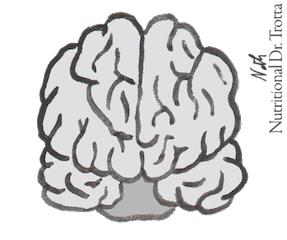
The 2nd is the intestine or Enteric Nervous System (ENS).
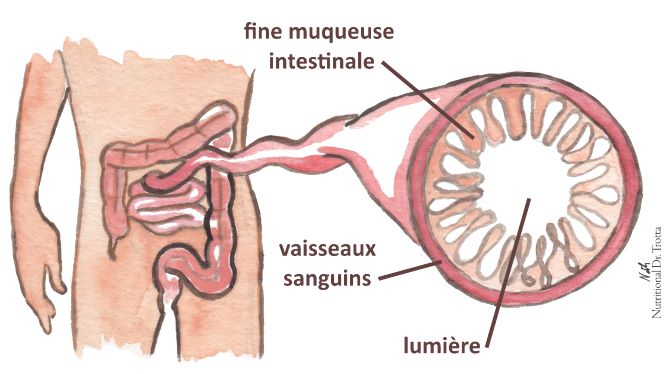
These 2 brains, the intestine and the brain, are in constant contact.
Because our second brain is in constant contact with our first brain.
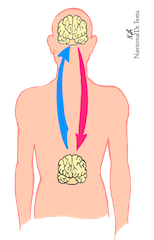
Via the Vagus Nerve (the X), one of the body’s largest nerves, which sends and receives information in both directions (the blue and red arrows) from the brain above to the brain below, and vice versa.
It’s been a long time since Dr Trotta and others with a keen interest in “Health Nutrition” have referred to the intestine not as the “digestive tract”, but as our “second brain”.
That’s why, at the age of 40, Dr Trotta decided to redirect his medical career towards the treatment of this intestine, abandoning radiology to devote himself to nutrition.
All current research confirms the importance of this intestine in our physical, emotional and rational health.
That’s why it’s so important to eat well, because a healthy diet ensures the primordial health of this second brain, and thus strengthens and better balances our rational brain from above.
And that’s what we want to teach you throughout this natural health blog, if you’ll follow us. You won’t be disappointed.
Dr Pascal Trotta
Related articles on the blog:
Dr Pascal Trotta
Former intern at the Hôpitaux de Paris, specialist physician, radiologist, homeopath, Founder of the Institut de Médecine Naturelle de Saint Sébastien.
Paseo de los Fueros 3, 20005 San Sebastián, Basque Country
www.dr-trotta.fr
Request an appointment for a consultation with Dr. Trotta
– on site.
– online .
Tel: 05 54 54 44 43
Need more information and to meet Dr. Pascal Trotta?
Make an appointmentAlso read
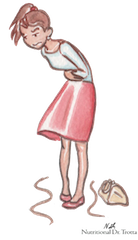
Crohn's disease
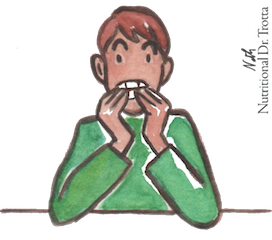
Gingivitis, an effective and environmentally-friendly treatment
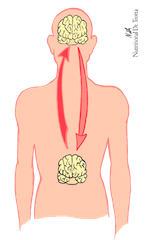
 The intestine, your 2nd brain!
The intestine, your 2nd brain!